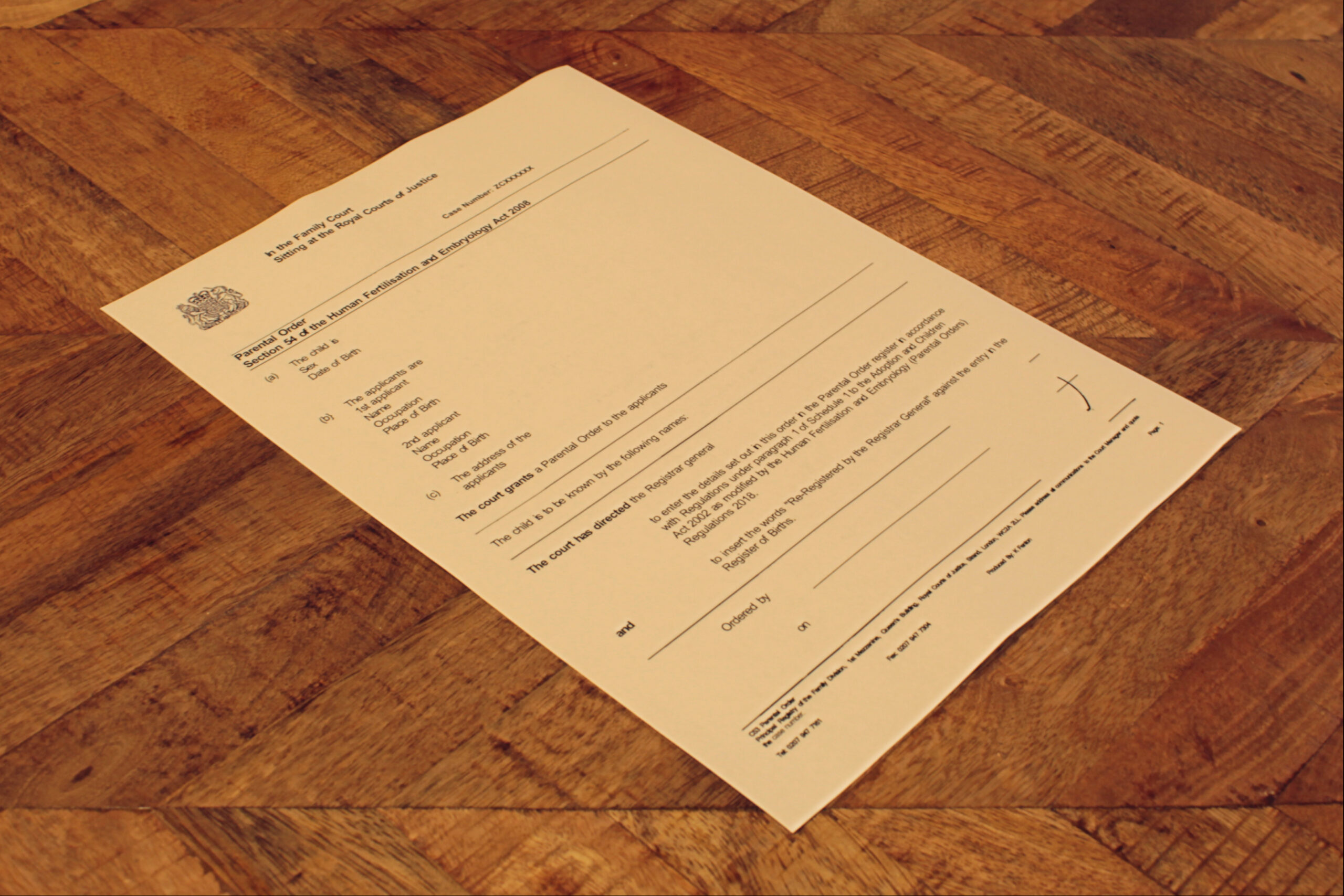The intended UK legal solution for resolving parenthood in surrogacy cases is a parental order. This is a post-birth court order which makes the intended parent or parents the legal parents of the child and permanently extinguishes the legal status and responsibilities of the surrogate and her spouse.
Once a parental order is made, a UK birth certificate will be issued recording the intended parents as the legal parents. In UK surrogacy cases, this replaces the original birth certificate which will then be sealed from public record. In international surrogacy cases, the child will be issued with a UK birth certificate in addition to the overseas birth certificate, but one which is fully recognised in the UK.
As the UK’s leading surrogacy lawyers, we have created this guide to clearly summarise how criteria and process for a parental order as part of surrogacy.
The criteria for a parental order – what the court is assessing
To obtain a parental order, the intended parent/s must satisfy the family court that they meet all the criteria set out in section 54 (for couples) or section 54A (for single parents) of the Human Fertilisation and Embryology Act 2008, which are:
The conception must have taken place by embryo transfer or artificial insemination, and the child must have been carried by a surrogate who is someone other than the intended parent/s.
The intended parent (or if a couple at least one of them) must be the child’s biological parent.
If the intended parents are applying as a couple they must be married, civil partners or living as partners in an enduring family relationship. Single applicants, who have been able to apply since 2019, do not have to meet any relationship status criteria.
The intended parents must submit their application to the court within the six months after their child is born (although the court can extend the deadline, following the ruling of the High Court in Re X (2014) that it was ‘nonsensical’ to bar late applications).
At the date they apply and the date the order is made, the child must have his or her home with the intended parent/s. Various cases have interpreted this requirement flexibly, including cases in which the parents were separated, not living together or one parent had died (for example Re X (2020)).
At the date they apply and the date of the order, the intended parent (or if applying as a couple at least one of them) must be ‘domiciled’ in a part of the United Kingdom, Channel Islands or Isle of Man. Domicile relates, not just to where parents are living or to their citizenship status, but to a much wider assessment of where their permanent home is. Therefore, parents living overseas with roots in the UK may be eligible to apply. For example, in the case of CC v DD (2014) a couple living in France was given a parental order after being satisfied that the British mother had retained her English domicile of origin. Conversely, parents living in the UK but originally from elsewhere may need to satisfy the court that they have settled permanently in the UK – just showing they live here will not be enough. In the case of AB v SA (2012) the court was satisfied that an American-Polish same-sex couple who had recently settled in the UK had acquired an English domicile of choice.
The intended parent/s must be over 18 when the order is made.
The surrogate and her spouse must fully and freely consent to the order (unless they cannot be found or are incapable of giving consent). The surrogate’s consent is invalid if it is given before the child is six weeks old. In UK surrogacy cases, consent is usually verified by the CAFCASS parental order reporter visiting the surrogate (and her spouse) in person to witness them signing the consent form and verify that they understand it. In international surrogacy cases, evidence will need to be produced by the parents. The court is always careful to ensure that a foreign surrogate understands any documents she is asked to sign, and that the formalities have been properly complied with. In Re D and L (2012), an Indian surrogate could not be found to give consent and the High Court ultimately waived the need for consent after significant effort to find her failed, but it is extremely rare to grant a parental order without the surrogate’s consent. In addition if the surrogate actively refuses her consent to the making of a parental order, the court has no power to make the order (as happened in Re A and B (2016)).
Either no more than reasonable expenses must have been paid, or the court must agree to ‘authorise’ any payments of more than expenses retrospectively. The court takes a broad and flexible approach to expenses in UK surrogacy cases. In international surrogacy cases where there is very clearly compensation beyond expenses being paid to the surrogate and the overseas agency, the court also has a long history of explicitly authorising payments retrospectively. There has never been a case where a parental order was refused due to the level of payments. The High Court’s first international surrogacy cases (Re X and Y (foreign surrogacy) 2008 and Re L (2010)) set the framework the court still applies. The court has said it would not refuse an order which was in the child’s best interests unless the case was one of the ‘clearest abuse of public policy’. However the court makes each decision on a case-by-case basis, and will need detailed information about what was paid as well as the wider context.
If the court is satisfied that the eligibility criteria are met, it will go on to consider whether the making of a parental order is appropriate to safeguard the child’s lifelong welfare. The approach to the welfare assessment is typically light touch, but the court will expect to be satisfied there are no safeguarding risks, and will encourage the parents to consider supporting their child’s long term welfare needs by being open and transparency about the fact they were born through surrogacy from an early age.
The court process for parental orders
Intended parents apply for a parental order by completing court Form C51 and submitting it to their local family court if their child is born in the UK, or to the Central Family Court in London if the child is born outside the UK.
The court will ‘issue’ (stamp) the application and should send a copy, together with a Form C52 (acknowledgment) to the intended parents who must then give this to their surrogate and her spouse (with a translation if English is not her first language). The surrogate and her spouse should complete and sign the C52 form and it should be returned to the court.
The court will appoint a parental order reporter (from the Child and Family Court Advisory and Support Service, which is an organisation of social workers which supports the family court). He or she will carry out background checks, meet the intended parent/s and child, and (if possible, if she is based in the UK) meet the surrogate and her partner. The parental order reporter then writes a report for the court setting out his or her welfare assessment and making a recommendation about whether a parental order should be made.
Straightforward UK surrogacy cases are dealt by lay magistrates at the most junior level of the family court and there will be typically be one celebration hearing. International surrogacy cases are automatically allocated to the High Court and are heard by one of a small number of specialist judges. The procedure in the High Court is significantly more formal, and extensive evidence and legal argument is usually required, with one or more court hearings. The court process can take anywhere between 4 and 12 months or more.
Do I really need a parental order?
A parental order secures the legal status of intended parents under UK law, and is needed even if the parents are already named on their child’s overseas birth certificate. Without a parental order, one or both of the intended parents will not be a legal parent in the UK which means:
- The parent/s not having legal authority to make basic decisions about their child’s medical care and education
- Problems with inheritance and pension rights
- Legal complications if the parents separate or divorce or one wishes to move abroad
- Difficulty obtaining or renewing a British passport
- Social services involvement (and in some cases a criminal offence for parents who fail to notify social services about their situation)
- Needing to find and involve the surrogate in future key decisions and any legal proceedings relating to the child.
What if a parental order is not available?
An adoption order is the closest alternative to a parental order. Like a parental order, it extinguishes the surrogate parents’ responsibilities and gives permanent parental status to the intended parents. The law and process on using adoption after surrogacy is not straightforward or well tested, but it is possible.
Find out more about adoption after conceiving a child through surrogacy.
Want to speak to a surrogacy solicitor?
Get in touch or find out more about our services.
Related articles

Legal rights in the post-birth period
Since UK law does not recognise the intended parents as the legal parents of their child from birth, there is a period of time during which the family is in legal limbo…

Surrogacy disputes in UK law
Intended parents considering surrogacy often worry about surrogacy agreements not being binding, and fear what might happen if the surrogate does not hand over the baby at birth. Equally many surrogates…

UK surrogacy law: history and reform
The UK’s surrogacy laws were written more than thirty years ago and are woefully out of date and out of step with modern understanding of families. Under the current…
